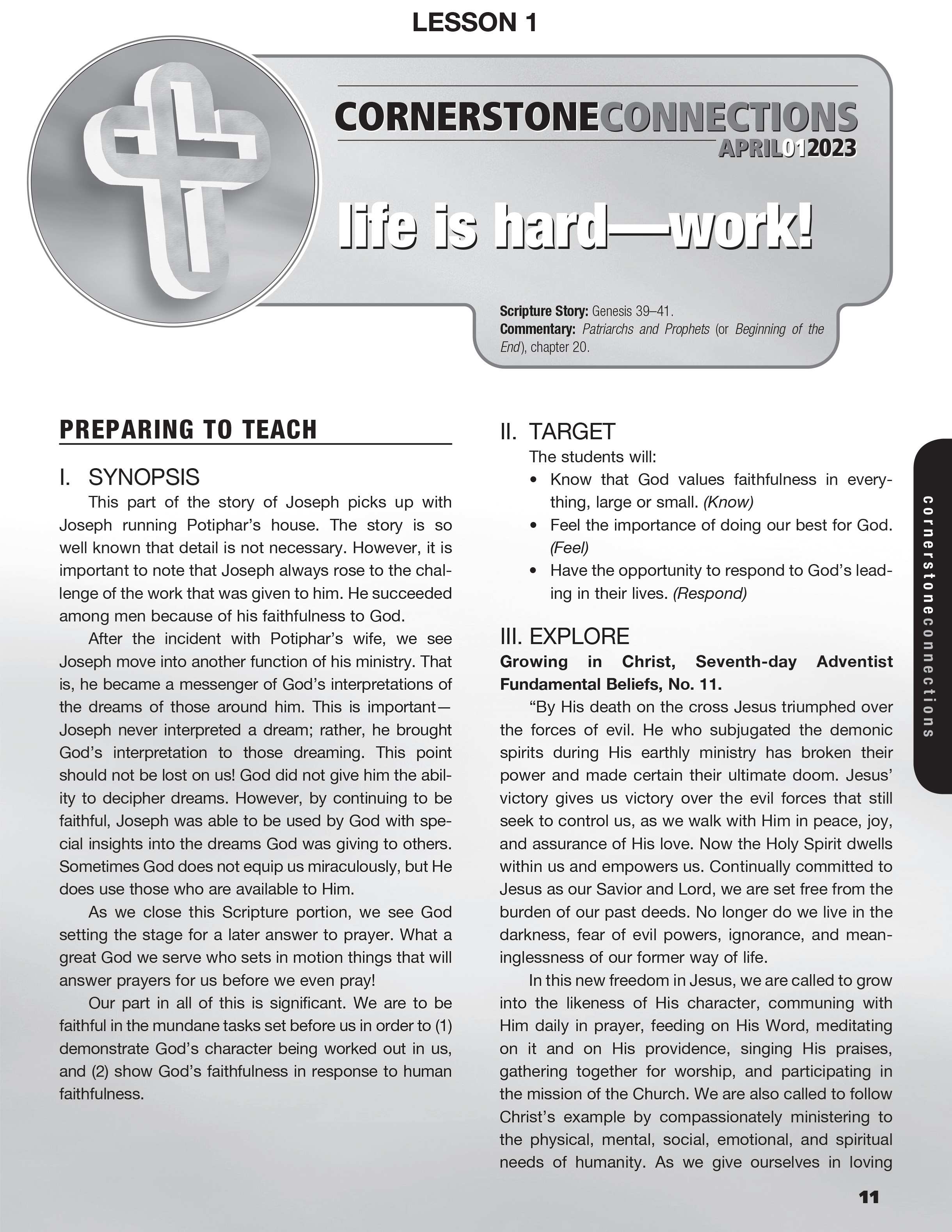“Life Is Hard—Work”
Click below to download the Cornerstone Connections leader’s guide and student lesson. This week’s resources also include two lesson plans and a discussion starter video which offer different ways of looking at the topic. Each lesson plan includes opening activities, scripture passages, discussion questions, and real-life applications.
Joseph works faithfully, trusting God’s control of his life, no matter in what circumstances he finds himself.
SCRIPTURE PASSAGES
OVERVIEW
Would it be easier or more difficult if all your life you could live without consequences? What would you do differently? Would you treat people better or worse? This phenomenon has been studied and is called the Hawthorne Effect (https://en.wikipedia.org/wiki/Hawthorne_effect#cite_note-pmid17608932-1 ).
If people know they are being watched, they do things differently. The scripture passages we are studying are about Joseph and how he lived. His life is a great example of what it is like to live when the consequences of one’s actions don’t change how one lives.

OPENING ACTIVITY: STRING BEAD PUZZLE
Items needed:
Watch the following YouTube video to see how to set-up the puzzle (it will help you know what to do and how to explain it to your students; it also has the solution, so you won’t want to show this to your students). https://www.youtube.com/watch?v=z5mTXV-cpfg
DISCUSSION
TRANSITION
The puzzle activity that you just did is like the story of Joseph that we are studying this week. It seems impossible to do, but persistence and creativity show that it is possible. The story of Joseph isn’t an easy one to understand at first. Things happened to Joseph that could make someone bitter and upset at God. Life wasn’t easy for him, yet he was able to see beyond the present and trust that God had a plan for his life. God had a solution to each and every one of Joseph’s challenges, but the solution wasn’t always obvious. Let’s dive into the story and see what God wants us to learn.
BIBLE STUDY GUIDE
Read Genesis 39:1-18.
Now Joseph had been taken down to Egypt. Potiphar, an Egyptian who was one of Pharaoh’s officials, the captain of the guard, bought him from the Ishmaelites who had taken him there.
2 The Lord was with Joseph so that he prospered, and he lived in the house of his Egyptian master. 3 When his master saw that the Lord was with him and that the Lord gave him success in everything he did, 4 Joseph found favor in his eyes and became his attendant. Potiphar put him in charge of his household, and he entrusted to his care everything he owned. 5 From the time he put him in charge of his household and of all that he owned, the Lord blessed the household of the Egyptian because of Joseph. The blessing of the Lord was on everything Potiphar had, both in the house and in the field. 6 So Potiphar left everything he had in Joseph’s care; with Joseph in charge, he did not concern himself with anything except the food he ate.
Now Joseph was well-built and handsome, 7 and after a while his master’s wife took notice of Joseph and said, “Come to bed with me!”
8 But he refused. “With me in charge,” he told her, “my master does not concern himself with anything in the house; everything he owns he has entrusted to my care. 9 No one is greater in this house than I am. My master has withheld nothing from me except you, because you are his wife. How then could I do such a wicked thing and sin against God?” 10 And though she spoke to Joseph day after day, he refused to go to bed with her or even be with her.
11 One day he went into the house to attend to his duties, and none of the household servants was inside. 12 She caught him by his cloak and said, “Come to bed with me!” But he left his cloak in her hand and ran out of the house.
13 When she saw that he had left his cloak in her hand and had run out of the house, 14 she called her household servants. “Look,” she said to them, “this Hebrew has been brought to us to make sport of us! He came in here to sleep with me, but I screamed. 15 When he heard me scream for help, he left his cloak beside me and ran out of the house.”
16 She kept his cloak beside her until his master came home. 17 Then she told him this story: “That Hebrew slave you brought us came to me to make sport of me. 18 But as soon as I screamed for help, he left his cloak beside me and ran out of the house.”
DISCUSSION
Read Genesis 40:1-23.
Some time later, the cupbearer and the baker of the king of Egypt offended their master, the king of Egypt. 2 Pharaoh was angry with his two officials, the chief cupbearer and the chief baker, 3 and put them in custody in the house of the captain of the guard, in the same prison where Joseph was confined. 4 The captain of the guard assigned them to Joseph, and he attended them.
After they had been in custody for some time, 5 each of the two men—the cupbearer and the baker of the king of Egypt, who were being held in prison—had a dream the same night, and each dream had a meaning of its own.
6 When Joseph came to them the next morning, he saw that they were dejected. 7 So he asked Pharaoh’s officials who were in custody with him in his master’s house, “Why do you look so sad today?”
8 “We both had dreams,” they answered, “but there is no one to interpret them.”
Then Joseph said to them, “Do not interpretations belong to God? Tell me your dreams.”
9 So the chief cupbearer told Joseph his dream. He said to him, “In my dream I saw a vine in front of me, 10 and on the vine were three branches. As soon as it budded, it blossomed, and its clusters ripened into grapes. 11 Pharaoh’s cup was in my hand, and I took the grapes, squeezed them into Pharaoh’s cup and put the cup in his hand.”
12 “This is what it means,” Joseph said to him. “The three branches are three days. 13 Within three days Pharaoh will lift up your head and restore you to your position, and you will put Pharaoh’s cup in his hand, just as you used to do when you were his cupbearer. 14 But when all goes well with you, remember me and show me kindness; mention me to Pharaoh and get me out of this prison. 15 I was forcibly carried off from the land of the Hebrews, and even here I have done nothing to deserve being put in a dungeon.”
16 When the chief baker saw that Joseph had given a favorable interpretation, he said to Joseph, “I too had a dream: On my head were three baskets of bread. 17 In the top basket were all kinds of baked goods for Pharaoh, but the birds were eating them out of the basket on my head.”
18 “This is what it means,” Joseph said. “The three baskets are three days. 19 Within three days Pharaoh will lift off your head and impale your body on a pole. And the birds will eat away your flesh.”
20 Now the third day was Pharaoh’s birthday, and he gave a feast for all his officials. He lifted up the heads of the chief cupbearer and the chief baker in the presence of his officials: 21 He restored the chief cupbearer to his position, so that he once again put the cup into Pharaoh’s hand—22 but he impaled the chief baker, just as Joseph had said to them in his interpretation.
23 The chief cupbearer, however, did not remember Joseph; he forgot him.
DISCUSSION
Read Genesis 41:9-36.
9 Then the chief cupbearer said to Pharaoh, “Today I am reminded of my shortcomings. 10 Pharaoh was once angry with his servants, and he imprisoned me and the chief baker in the house of the captain of the guard. 11 Each of us had a dream the same night, and each dream had a meaning of its own. 12 Now a young Hebrew was there with us, a servant of the captain of the guard. We told him our dreams, and he interpreted them for us, giving each man the interpretation of his dream. 13 And things turned out exactly as he interpreted them to us: I was restored to my position, and the other man was impaled.”
14 So Pharaoh sent for Joseph, and he was quickly brought from the dungeon. When he had shaved and changed his clothes, he came before Pharaoh.
15 Pharaoh said to Joseph, “I had a dream, and no one can interpret it. But I have heard it said of you that when you hear a dream you can interpret it.”
16 “I cannot do it,” Joseph replied to Pharaoh, “but God will give Pharaoh the answer he desires.”
17 Then Pharaoh said to Joseph, “In my dream I was standing on the bank of the Nile, 18 when out of the river there came up seven cows, fat and sleek, and they grazed among the reeds. 19 After them, seven other cows came up—scrawny and very ugly and lean. I had never seen such ugly cows in all the land of Egypt. 20 The lean, ugly cows ate up the seven fat cows that came up first. 21 But even after they ate them, no one could tell that they had done so; they looked just as ugly as before. Then I woke up.
22 “In my dream I saw seven heads of grain, full and good, growing on a single stalk. 23 After them, seven other heads sprouted—withered and thin and scorched by the east wind. 24 The thin heads of grain swallowed up the seven good heads. I told this to the magicians, but none of them could explain it to me.”
25 Then Joseph said to Pharaoh, “The dreams of Pharaoh are one and the same. God has revealed to Pharaoh what he is about to do. 26 The seven good cows are seven years, and the seven good heads of grain are seven years; it is one and the same dream. 27 The seven lean, ugly cows that came up afterward are seven years, and so are the seven worthless heads of grain scorched by the east wind: They are seven years of famine.
28 “It is just as I said to Pharaoh: God has shown Pharaoh what he is about to do. 29 Seven years of great abundance are coming throughout the land of Egypt, 30 but seven years of famine will follow them. Then all the abundance in Egypt will be forgotten, and the famine will ravage the land. 31 The abundance in the land will not be remembered, because the famine that follows it will be so severe. 32 The reason the dream was given to Pharaoh in two forms is that the matter has been firmly decided by God, and God will do it soon.
33 “And now let Pharaoh look for a discerning and wise man and put him in charge of the land of Egypt. 34 Let Pharaoh appoint commissioners over the land to take a fifth of the harvest of Egypt during the seven years of abundance. 35 They should collect all the food of these good years that are coming and store up the grain under the authority of Pharaoh, to be kept in the cities for food. 36 This food should be held in reserve for the country, to be used during the seven years of famine that will come upon Egypt, so that the country may not be ruined by the famine.”
DISCUSSION

APPLICATION
In each section, you have been asked a similar set of questions. What is the progression of events in each section? How did Joseph respond when Pharaoh summoned him from prison? How would you have responded when you saw the baker? Life doesn’t always seem fair. There’s never law enforcement around when some jerk is speeding and cuts you off or almost hits you because they ran a red light. Followers of Christ are called to live the same way whether people are watching or not. Integrity is a way of life, not a matter of convenience. Hopefully the story of Joseph gave you insight into how to live a life of integrity that is pleasing to God.
FOLLOW UP

SCRIPTURE PASSAGE
LEADER’S NOTE
For a Relational Bible Study (RBS) you’ll want to get into the Scripture passage and encourage the youth to imagine participating in the story while it’s happening. Then you will be able to better apply it to your own situation today.
You will need to ask God for the Holy Spirit to be present as your small group discusses the questions (no more than 3-6 people in a group is recommended). Start with the opening question. It is a personal question and the answer is unique for each individual. There is no right answer and nobody is an expert here, so don’t be surprised when you hear different responses. You are depending on the Holy Spirit to be present and to speak through your group. Say what God prompts you to say, and listen to what others share.
Take turns reading the chapter out loud. Follow that with giving the students some time to individually mark their responses to the questions (a PDF version of the handout is available as a download). This gives each person a starting point for responding when you start to share as a group. Next, begin the discussion by asking the students to share what they marked and why on each question as you work your way through. Feel free to take more time on some questions than others as discussion warrants.
Encourage each person in the group to apply what is discussed to their personal lives and to share with the group what they believe God wants them to do. Then ask them to pray that God will help each of them to follow through in doing so. Remind them to expect that God will show them ways to live out the message of this passage in the coming week, and that they are free to ask others in the group to help hold them accountable.
OVERVIEW
Have you ever had one of those days when everything just seemed to go wrong? You missed the bus. You were late for school. You didn’t get to eat breakfast. You forgot your homework. You had a pop quiz in math. You dressed up for spirit week, but it was the wrong week. And then to top it all off, your friends ordered pizza with mushrooms and green olives, thinking that it would cheer you up. It would have been great too, except for one thing. You hate green olives! Yep, that sounds like a pretty bad day to me.
So, what happens when your bad day turns into a week, a month, or worse? You would probably be able to relate to Joseph. Talk about a series of unfortunate events. This poor guy went from being happy-go-lucky to devastated and depressed all within a matter of moments.
Murphy’s Law states anything that can go wrong will go wrong. This is a law that Joseph knew all too well. Yet, through it all, the Bible tells us that God was with him.
Genesis 39 makes that point extremely clear. As a matter of fact, the phrase of God being with Joseph, or at least some variation of it, appears more than seven times. [Genesis 39:2, 3, 5(2x), 21(2x), 23(2x)]. Even though Joseph’s life had been flipped upside down, God was with him through it all. He was with Joseph when he was sold as a 17-year-old slave, accused of a terrible crime, then tossed into prison. He was even with Joseph when he finally became prime minister of Egypt.
I’m sure there must have been moments when young Joseph wondered where God was and how He could allow all of these bad things to happen. But he found that God was right there protecting His inheritance [Genesis 45:5-8; Genesis 50:20]. Let’s take a look at how a series of unfortunate events in scripture turned out to be part of a greater purpose.
A Series of Unfortunate Events!
Recall and share a day when you had a series of unfortunate events happen.
Read Genesis 39:1-23.
Now Joseph had been taken down to Egypt. Potiphar, an Egyptian who was one of Pharaoh’s officials, the captain of the guard, bought him from the Ishmaelites who had taken him there.
2 The Lord was with Joseph so that he prospered, and he lived in the house of his Egyptian master. 3 When his master saw that the Lord was with him and that the Lord gave him success in everything he did, 4 Joseph found favor in his eyes and became his attendant. Potiphar put him in charge of his household, and he entrusted to his care everything he owned. 5 From the time he put him in charge of his household and of all that he owned, the Lord blessed the household of the Egyptian because of Joseph. The blessing of the Lord was on everything Potiphar had, both in the house and in the field. 6 So Potiphar left everything he had in Joseph’s care; with Joseph in charge, he did not concern himself with anything except the food he ate.
Now Joseph was well-built and handsome, 7 and after a while his master’s wife took notice of Joseph and said, “Come to bed with me!”
8 But he refused. “With me in charge,” he told her, “my master does not concern himself with anything in the house; everything he owns he has entrusted to my care. 9 No one is greater in this house than I am. My master has withheld nothing from me except you, because you are his wife. How then could I do such a wicked thing and sin against God?” 10 And though she spoke to Joseph day after day, he refused to go to bed with her or even be with her.
11 One day he went into the house to attend to his duties, and none of the household servants was inside. 12 She caught him by his cloak and said, “Come to bed with me!” But he left his cloak in her hand and ran out of the house.
13 When she saw that he had left his cloak in her hand and had run out of the house, 14 she called her household servants. “Look,” she said to them, “this Hebrew has been brought to us to make sport of us! He came in here to sleep with me, but I screamed. 15 When he heard me scream for help, he left his cloak beside me and ran out of the house.”
16 She kept his cloak beside her until his master came home. 17 Then she told him this story: “That Hebrew slave you brought us came to me to make sport of me. 18 But as soon as I screamed for help, he left his cloak beside me and ran out of the house.”
19 When his master heard the story his wife told him, saying, “This is how your slave treated me,” he burned with anger. 20 Joseph’s master took him and put him in prison, the place where the king’s prisoners were confined.
But while Joseph was there in the prison, 21 the Lord was with him; he showed him kindness and granted him favor in the eyes of the prison warden. 22 So the warden put Joseph in charge of all those held in the prison, and he was made responsible for all that was done there. 23 The warden paid no attention to anything under Joseph’s care, because the Lord was with Joseph and gave him success in whatever he did.
Read Genesis 40:1-23.
Some time later, the cupbearer and the baker of the king of Egypt offended their master, the king of Egypt. 2 Pharaoh was angry with his two officials, the chief cupbearer and the chief baker, 3 and put them in custody in the house of the captain of the guard, in the same prison where Joseph was confined. 4 The captain of the guard assigned them to Joseph, and he attended them.
After they had been in custody for some time, 5 each of the two men—the cupbearer and the baker of the king of Egypt, who were being held in prison—had a dream the same night, and each dream had a meaning of its own.
6 When Joseph came to them the next morning, he saw that they were dejected. 7 So he asked Pharaoh’s officials who were in custody with him in his master’s house, “Why do you look so sad today?”
8 “We both had dreams,” they answered, “but there is no one to interpret them.”
Then Joseph said to them, “Do not interpretations belong to God? Tell me your dreams.”
9 So the chief cupbearer told Joseph his dream. He said to him, “In my dream I saw a vine in front of me, 10 and on the vine were three branches. As soon as it budded, it blossomed, and its clusters ripened into grapes. 11 Pharaoh’s cup was in my hand, and I took the grapes, squeezed them into Pharaoh’s cup and put the cup in his hand.”
12 “This is what it means,” Joseph said to him. “The three branches are three days. 13 Within three days Pharaoh will lift up your head and restore you to your position, and you will put Pharaoh’s cup in his hand, just as you used to do when you were his cupbearer. 14 But when all goes well with you, remember me and show me kindness; mention me to Pharaoh and get me out of this prison. 15 I was forcibly carried off from the land of the Hebrews, and even here I have done nothing to deserve being put in a dungeon.”
16 When the chief baker saw that Joseph had given a favorable interpretation, he said to Joseph, “I too had a dream: On my head were three baskets of bread. 17 In the top basket were all kinds of baked goods for Pharaoh, but the birds were eating them out of the basket on my head.”
18 “This is what it means,” Joseph said. “The three baskets are three days. 19 Within three days Pharaoh will lift off your head and impale your body on a pole. And the birds will eat away your flesh.”
20 Now the third day was Pharaoh’s birthday, and he gave a feast for all his officials. He lifted up the heads of the chief cupbearer and the chief baker in the presence of his officials: 21 He restored the chief cupbearer to his position, so that he once again put the cup into Pharaoh’s hand—22 but he impaled the chief baker, just as Joseph had said to them in his interpretation.
23 The chief cupbearer, however, did not remember Joseph; he forgot him.
Read Genesis 41:1-57.
1When two full years had passed, Pharaoh had a dream: He was standing by the Nile, 2 when out of the river there came up seven cows, sleek and fat, and they grazed among the reeds. 3 After them, seven other cows, ugly and gaunt, came up out of the Nile and stood beside those on the riverbank. 4 And the cows that were ugly and gaunt ate up the seven sleek, fat cows. Then Pharaoh woke up.
5 He fell asleep again and had a second dream: Seven heads of grain, healthy and good, were growing on a single stalk. 6 After them, seven other heads of grain sprouted—thin and scorched by the east wind. 7 The thin heads of grain swallowed up the seven healthy, full heads. Then Pharaoh woke up; it had been a dream.
8 In the morning his mind was troubled, so he sent for all the magicians and wise men of Egypt. Pharaoh told them his dreams, but no one could interpret them for him.
9 Then the chief cupbearer said to Pharaoh, “Today I am reminded of my shortcomings. 10 Pharaoh was once angry with his servants, and he imprisoned me and the chief baker in the house of the captain of the guard. 11 Each of us had a dream the same night, and each dream had a meaning of its own. 12 Now a young Hebrew was there with us, a servant of the captain of the guard. We told him our dreams, and he interpreted them for us, giving each man the interpretation of his dream. 13 And things turned out exactly as he interpreted them to us: I was restored to my position, and the other man was impaled.”
14 So Pharaoh sent for Joseph, and he was quickly brought from the dungeon. When he had shaved and changed his clothes, he came before Pharaoh.
15 Pharaoh said to Joseph, “I had a dream, and no one can interpret it. But I have heard it said of you that when you hear a dream you can interpret it.”
16 “I cannot do it,” Joseph replied to Pharaoh, “but God will give Pharaoh the answer he desires.”
17 Then Pharaoh said to Joseph, “In my dream I was standing on the bank of the Nile, 18 when out of the river there came up seven cows, fat and sleek, and they grazed among the reeds. 19 After them, seven other cows came up—scrawny and very ugly and lean. I had never seen such ugly cows in all the land of Egypt. 20 The lean, ugly cows ate up the seven fat cows that came up first. 21 But even after they ate them, no one could tell that they had done so; they looked just as ugly as before. Then I woke up.
22 “In my dream I saw seven heads of grain, full and good, growing on a single stalk. 23 After them, seven other heads sprouted—withered and thin and scorched by the east wind. 24 The thin heads of grain swallowed up the seven good heads. I told this to the magicians, but none of them could explain it to me.”
25 Then Joseph said to Pharaoh, “The dreams of Pharaoh are one and the same. God has revealed to Pharaoh what he is about to do. 26 The seven good cows are seven years, and the seven good heads of grain are seven years; it is one and the same dream. 27 The seven lean, ugly cows that came up afterward are seven years, and so are the seven worthless heads of grain scorched by the east wind: They are seven years of famine.
28 “It is just as I said to Pharaoh: God has shown Pharaoh what he is about to do. 29 Seven years of great abundance are coming throughout the land of Egypt, 30 but seven years of famine will follow them. Then all the abundance in Egypt will be forgotten, and the famine will ravage the land. 31 The abundance in the land will not be remembered, because the famine that follows it will be so severe. 32 The reason the dream was given to Pharaoh in two forms is that the matter has been firmly decided by God, and God will do it soon.
33 “And now let Pharaoh look for a discerning and wise man and put him in charge of the land of Egypt. 34 Let Pharaoh appoint commissioners over the land to take a fifth of the harvest of Egypt during the seven years of abundance. 35 They should collect all the food of these good years that are coming and store up the grain under the authority of Pharaoh, to be kept in the cities for food. 36 This food should be held in reserve for the country, to be used during the seven years of famine that will come upon Egypt, so that the country may not be ruined by the famine.”
37 The plan seemed good to Pharaoh and to all his officials. 38 So Pharaoh asked them, “Can we find anyone like this man, one in whom is the spirit of God?”
39 Then Pharaoh said to Joseph, “Since God has made all this known to you, there is no one so discerning and wise as you. 40 You shall be in charge of my palace, and all my people are to submit to your orders. Only with respect to the throne will I be greater than you.”
Joseph in Charge of Egypt
41 So Pharaoh said to Joseph, “I hereby put you in charge of the whole land of Egypt.” 42 Then Pharaoh took his signet ring from his finger and put it on Joseph’s finger. He dressed him in robes of fine linen and put a gold chain around his neck. 43 He had him ride in a chariot as his second-in-command, k and people shouted before him, “Make way!” Thus he put him in charge of the whole land of Egypt.
44 Then Pharaoh said to Joseph, “I am Pharaoh, but without your word no one will lift hand or foot in all Egypt.” 45 Pharaoh gave Joseph the name Zaphenath-Paneah and gave him Asenath daughter of Potiphera, priest of On, q to be his wife. And Joseph went throughout the land of Egypt.
46 Joseph was thirty years old when he entered the service of Pharaoh king of Egypt. And Joseph went out from Pharaoh’s presence and traveled throughout Egypt. 47 During the seven years of abundance the land produced plentifully. 48 Joseph collected all the food produced in those seven years of abundance in Egypt and stored it in the cities. In each city he put the food grown in the fields surrounding it. 49 Joseph stored up huge quantities of grain, like the sand of the sea; it was so much that he stopped keeping records because it was beyond measure.
50 Before the years of famine came, two sons were born to Joseph by Asenath daughter of Potiphera, priest of On. 51 Joseph named his firstborn Manasseh z and said, “It is because God has made me forget all my trouble and all my father’s household.” 52 The second son he named Ephraim a and said, “It is because God has made me fruitful in the land of my suffering.”
53 The seven years of abundance in Egypt came to an end, 54 and the seven years of famine began, just as Joseph had said. There was famine in all the other lands, but in the whole land of Egypt there was food. 55 When all Egypt began to feel the famine, the people cried to Pharaoh for food. Then Pharaoh told all the Egyptians, “Go to Joseph and do what he tells you.”
56 When the famine had spread over the whole country, Joseph opened all the storehouses and sold grain to the Egyptians, for the famine was severe throughout Egypt. 57 And all the world came to Egypt to buy grain from Joseph, because the famine was severe everywhere.
1. Why was Joseph in Potiphar’s house?
2. In what ways can you be like Joseph and represent God well?
3. Rank (1-9) which best reminds you that God is with you during trials?
____ A. Read God’s word.
____ B. Pray.
____ C. Listen to music.
____ D. Talk to a friend.
____ E. Journal how God has been faithful in the past.
____ F. Meditate and remember promises found in the Bible.
____ G. Go out in nature.
____ H. Look at inspirational movies or media.
____ I. Other.
4. Why do you think God gave Joseph the gift of interpreting dreams?
5. How did God’s gift to Joseph help him in the long run?
6. Joseph had the gift to interpret dreams. What are some of your gifts?
7. Have you ever wanted to retaliate when you were done wrong to? How did you respond?
8. Would you do something that went against your Christian beliefs if no one was watching? What if you were guaranteed that it would never be discovered?
SUMMARY
Like there was for Joseph, there will be times when you find yourself facing a series of unfortunate events, when Murphy’s law is in full effect, and anything that can go wrong will go wrong. But, like Joseph, you are not alone. God is with you. He is with you to withstand temptations, as pointed out in 1 Corinthians 10:13. He is with you in moments when people accuse you falsely. And never, never think for a moment that He has forgotten you. Instead, let Joseph’s story serve as a reminder that sometimes God is simply working silently in the background.
So, the next time you find yourself facing days that leave you feeling completely overwhelmed and facing one obstacle after another, take a deep breath and remember Who is with you. Then confidently tell yourself the following words. “Things are going to be okay. God is just using these setbacks as set ups for sensational comebacks.”

APPLICATION
In this week’s story we saw how Joseph met one unfortunate event after another, but we also read how God was portrayed as being with Joseph through each unfortunate event.
Do unto others as you would have them do unto you. The “Golden Rule” is sometimes easier to say than it is to practice, especially when you are the one who has been wronged. The Bible does not tell us anything about what happened between Joseph and the Potiphars after Joseph came into power. It does not tell us if he ever confronted them for having been wrongfully accused. Chances are, if they were still alive, they lived some of their lives in fear. Or perhaps, Joseph removed their fear by offering them forgiveness.
It is not uncommon for people to want favors to be returned for favors. We even saw this in Genesis 40. After Joseph rightly interpreted the cupbearer’s dream, he asked him to remember and mention him to Pharaoh.
In Genesis 41, after Joseph ascended to power, he was blessed with a wife and two sons. The first born was named Manasseh, which means, “God made me forget.” The second son was named Ephraim, which means, “God has made me fruitful.”





